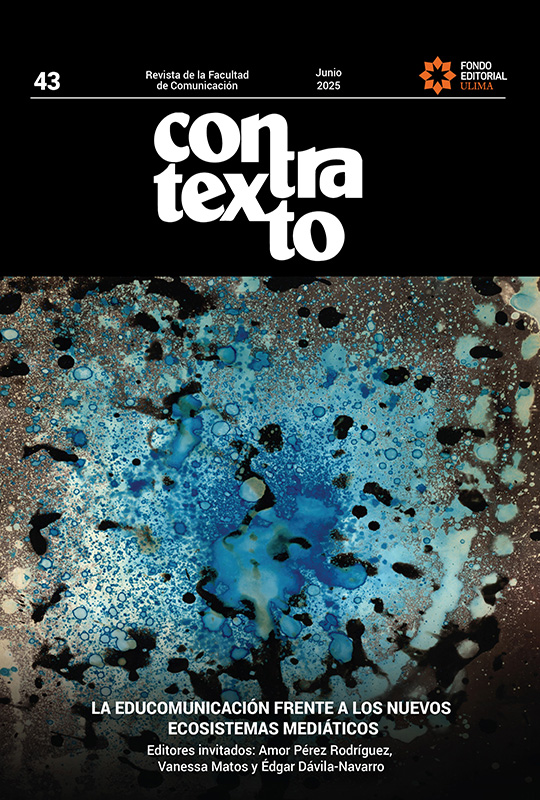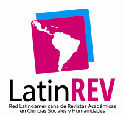Studies on media education in university training of communicators: a scoping review
DOI:
https://doi.org/10.26439/contratexto2025.n43.7506Keywords:
media education, university students, media competence, training of communicators, media literacyAbstract
Most studies on media education, literacy and competence focus on basic education and teacher training; in this context, university training for communicators has not received the attention we believe it should have. Therefore, this article presents the results of a systematic exploratory review, following the PRISMA ScR model, of 55 articles published in five scientific reference databases that present empirical studies on media education in university communication courses. The results show that, since 2019, there has been an increase in interest in this subject, that the largest amount of scientific work has been published in English, that nearly half of it presents a theoretical framework on topics related to media education, that quantitative methodologies prevail in the design of studies with the survey as the main tool. Finally, based on the analysis of the objects of study of the reviewed literature, a proposal of eight areas of interest is organized.
Downloads
References
Aguaded, I., Marín Gutiérrez, I., & Caldeiro Pedreira, M. C. (2018). Desarrollo de la competencia mediática en el contexto iberoamericano. Revista Letral, Estudios Trasatlánticos de Literatura, (20), 156-182. https://revistaseug.ugr.es/index.php/letral/article/view/7814
Agudelo-González, L. E., Marta-Lazo, C., & Aguaded, I. (2022). Competencias digitales en el currículo de periodismo: análisis de caso de una universidad centroamericana. Vivat Academia, (155), 297-316. https://doi.org/10.15178/va.2022.155.e1393
Altamirano Galván, S. G. (2021). Perfil de alfabetización mediática de estudiantes y docentes de educación superior. CPU-e, Revista de Investigación Educativa, (32), 88-110. https://doi.org/10.25009/cpue.v0i32.2735
Aparicio González, D., Tucho, F., & Marfil-Carmona, R. (2020). Las dimensiones de la competencia mediática en estudiantes universitarios españoles. Icono 14. Revista Científica de Comunicación y Tecnologías Emergentes, 18(2), 217-244. https://doi.org/10.7195/ri14.v18i2.1492
Ashton, D. (2009). Thinking with games: Exploring digital gaming imaginaries and values in higher education. Journal of Media Practice, 10(1), 57-68. https://doi.org/10.1386/jmpr.10.1.57_1
Assad, A. (2024). Exploring the use of ChatGPT among media students in Egypt: Opportunities and challenges. Online Journal of Communication and Media Technologies, 14(2), e202424. https://doi.org/10.30935/ojcmt/14416
Barcelos, T. do N. de, Muniz, L. N., Dantas, D. M., Cotrim Junior, D. F., Cavalcante, J. R., & Faerstein, E. (2021). Análise de fake news veiculadas durante a pandemia de COVID-19 no Brasil. Revista Panamericana de Salud Pública, (45), e65. https://doi.org/10.26633/RPSP.2021.65
Barranquero Carretero, A., & Rosique Cedillo, G. (2014). La formación en comunicación/educación para el cambio social en la universidad española. Rutas para un diálogo interdisciplinar. Cuadernos.Info, (35), 83-102. https://doi.org/10.7764/cdi.35.656
Behailu, A. (2021). Higher education students’ social media literacy in Ethiopia: A case of Bahir Dar University. Journal of Media Literacy Education, 13(3), 86-96. https://doi.org/10.23860/JMLE-2021-13-3-7
Bergstrom, A., Flynn, M., & Craig, C. (2018). Deconstructing media in the college classroom: A longitudinal critical media literacy intervention. Journal of Media Literacy Education, 10(3), 113-131. https://doi.org/10.23860/JMLE-2018-10-03-07
Buitrago, A., Ferrés, J., & García Matilla, A. (2015). La educación en competencia mediática en el currículum de los periodistas. Index.Comunicación, 5(3), 101-120. https://search.ebscohost.com/login.aspx?direct=true&db=cms&AN=113171153&site=ehost-live
Calvo, D., Cano-Orón, L., & Esteban, A. (2020). Materiales y evaluación del nivel de alfabetización para el reconocimiento de bots sociales en contextos de desinformación política. Icono 14. Revista Científica de Comunicación y Tecnologías Emergentes, 18(2),111-37. https://doi.org/10.7195/ri14.v18i2.1515
Codina, L. (2024). Revisiones tradicionales, sistemáticas o de alcance: ¿cómo elegir el tipo de revisión de la literatura que corresponde en cada caso? Infonomy, 2(2). https://doi.org/10.3145/infonomy.24.021
Colussi, J., De Souza Paes, P., Rubira-García, R., & Assunção Reis, T. (2024). Perceptions of university students in communication about disinformation: An exploratory analysis in Brazil, Colombia and Spain. Observatorio (OBS*), 18(5), 195-212. https://doi.org/10.15847/obsOBS18520242446
Coopman, S., & Coopman, T. (2020). [email protected]: Using the tech start-up concept to train, engage, and inform students. Ubiquitous Learning: An International Journal, 13(1), 1-28. https://doi.org/10.18848/1835-9795/CGP/v13i01/1-28
Del Moral-Pérez, M. E., Bellver Moreno, M. del C., Castañeda Fernández, J., & López-Bouzas, N. (2022). Elementos potenciadores del “engagement” de los jóvenes con narrativas proambientales. Área Abierta. Revista de Comunicación Audiovisual y Publicitaria, 22(3), 297-319. https://doi.org/10.5209/arab.83549
Dumbili, E. W., & Henderson, L. (2017). Mediating alcohol use in Eastern Nigeria: A qualitative study exploring the role of popular media in young people’s recreational drinking. Health Education Research, 32(3), 279-291. https://doi.org/10.1093/her/cyx043
Er-raid, O., & Chouari, A. (2023). Teaching critical media literacy to fight fake news in Moroccan higher education: Focus on Facebook and YouTube. Arab World English Journal, 14(1), 300-315. https://doi.org/10.24093/awej/vol14no1.19
Fedorov, A. (2011). Alfabetización mediática en el mundo. Breve repaso histórico. Infoamérica: Iberoamerican Communication Review, (5), 7-23. https://www.infoamerica.org/icr/n05/fedorov.pdf
Ferrés, J., & Piscitelli, A. (2012). La competencia mediática: propuesta articulada de dimensiones e indicadores. Comunicar. Revista Científica de Comunicación y Educación, 19(38), 75-82. https://doi.org/10.3916/C38-2012-02-08
Figueira, J., & Santos, S. (2019). Percepción de las noticias falsas en universitarios de Portugal: análisis de su consumo y actitudes. Profesional de la Información, 28(3). e280315. https://doi.org/10.3145/epi.2019.may.15
Figueras-Maz, M., Grandío-Pérez, M.-M., & Mateus, J.-C. (2021). Students’ perceptions on social media teaching tools in higher education settings. Communication & Society, 34(1), 15-28. https://doi.org/10.15581/003.34.1.15-28
Frolova, E., & Rogach, O. (2022). Media competence of modern students: Problems and possibilities of its formation in the system of higher education. Media Education (Mediaobrazovanie), 18(1), 46-54. https://doi.org/10.13187/me.2022.1.46
Frolova, E., Rogach, O., & Tyurikov, A. (2022). Student’s media competence: New opportunities to counteract information manipulations in network interactions. Media Education (Mediaobrazovanie), 18(3), 380-389. https://doi.org/10.13187/me.2022.3.380
Gaultney, I. B., Sherron, T., & Boden, C. (2022). Political polarization, misinformation, and media literacy. Journal of Media Literacy Education, 14(1), 59-81. https://doi.org/10.23860/JMLE-2022-14-1-5
Gerodimos, R. (2018). Youth and the city: Reflective photography as a tool of urban voice. Journal of Media Literacy Education, 10(1), 82-103. https://doi.org/10.23860/JMLE-2018-10-1-5
Gómez-Galán, J., Martínez-López, J. Á., Lázaro-Pérez, C., & Fernández-Martínez, M. del M. (2021). Usage of internet by university students of Hispanic countries: Analysis aimed at digital literacy processes in higher education. European Journal of Contemporary Education, 10(1), 53-65. https://doi.org/10.13187/ejced.2021.1.53
Gozansky, Y. (2021). How a hands-on workshop offered by communication undergraduates in Israel enhanced fifth graders’ news literacy skills. Journal of Media Literacy Education, 13(1), 131-137. https://doi.org/10.23860/JMLE-2021-13-1-11
Grandío-Pérez, M. M. (2016). El transmedia en la enseñanza universitaria. Análisis de las asignaturas de educación mediática en España (2012-2013). Palabra Clave, 19(1), 85-104. https://doi.org/10.5294/pacla.2016.19.1.4
Grijalva Verdugo, A. A., & Lara Rivera, J. A. (2019). Competencias mediáticas en jóvenes universitarios. Análisis de saberes para producir contenido digital en una IES mexicana. Edutec. Revista Electrónica de Tecnología Educativa, (67), 16-30. https://doi.org/10.21556/edutec.2019.67.1297
Herrero Curiel, E., & González Aldea, P. (2022). Impacto de las fake news en estudiantes de periodismo y comunicación audiovisual de la universidad Carlos III de Madrid. Vivat Academia. Revista de Comunicación, (155), 1-21. https://doi.org/10.15178/va.2022.155.e1415
Higdon, N. (2022). The critical effect: Exploring the influence of critical media literacy pedagogy on college students’ social media behaviors and attitudes. Journal of Media Literacy Education, 14(1), 1-13. https://doi.org/10.23860/JMLE-2022-14-1-1
Horska, K., Burov, O., & Orliyk, O. (2022). Impact of media technologies on digital educational content in media sector. Information Technologies and Learning Tools, 91(5), 84-97. https://doi.org/10.33407/itlt.v91i5.5047
Izquierdo-Iranzo, P., & Gallardo-Echenique, E. (2020). Studygrammers: Learning influencers. Comunicar. Revista Científica de Educomunicación, 28(62), 115-125. https://doi.org/10.3916/C62-2020-10
Jitsaeng, K., & Tuamsuk, K. (2022). Digital factors influencing the use of social media in political communication among Thai youths. International Journal of Media and Information Literacy, 7(2), 450-462. https://doi.org/10.13187/ijmil.2022.2.450
Lee, A., & So, C. (2014). Alfabetización mediática y alfabetización informacional: similitudes y diferencias. Comunicar. Revista Científica de Comunicación y Educación, 21(42), 137-146. https://doi.org/10.3916/C42-2014-13
Lomteva, E., Vorobyeva, N., & Demidov, A. (2022). Media center as a resource for the development of general competencies of college students. Media Education (Mediaobrazovanie), 18(2), 266-276. https://doi.org/10.13187/me.2022.2.266
López Gil, K., & Sandoval Sarrias, A. (2023). Participación ciudadana y literacidad crítica digital de estudiantes universitarios. Revista Latinoamericana de Tecnología Educativa RELATEC, 22(2), 27-42. https://doi.org/10.17398/1695-288X.22.2.27
López-Romero, L., & Aguaded-Gómez, M. (2015). La docencia sobre alfabetización mediática en las facultades de educación y comunicación. Comunicar. Revista Científica de Educomunicación, 22(44), 187-195. https://doi.org/10.3916/C44-2015-20
Matthews, J. C. (2022). College students’ perspectives of bias in their news consumption habits. Journal of Media Literacy Education, 14(3), 39-52. https://doi.org/10.23860/JMLE-2022-14-3-4
Mihailidis, P. (2009). The first step is the hardest: Finding connections in media literacy education. Journal of Media Literacy Education, 1(1), 53-67. https://doi.org/10.23860/jmle-1-1-5
Munn, Z., Pollock, D., Khalil, H., Alexander, L., Mclnerney, P., Godfrey, C. M., Peters, M., & Tricco, A. C. (2022). What are scoping reviews? Providing a formal definition of scoping reviews as a type of evidence synthesis. JBI Evidence Synthesis, 20(4), 950-952. https://doi.org/10.11124/JBIES-21-00483
National Association for Media Literacy Education. (s. f.). Media literacy defined. https://namle.org/resources/media-literacy-defined/
Palau-Sampio, D., Carratalá, A., Tarullo, R., & Crisóstomo, P. (2022). Reconocimiento de la calidad como prescriptor contra la desinformación. Comunicar. Revista Científica de Comunicación y Educación, 30(72), 59-70. https://doi.org/10.3916/C72-2022-05
Pérez-Escoda, A. (2022). Infodemic and fake news turning shift for media: Distrust among university students. Information, 13(11), 523. https://doi.org/10.3390/info13110523
Peters, M. D. J., Marnie, C., Tricco, A. C., Pollock, D., Munn, Z., Alexander, L., McInerney, P., Godfrey, C. M., & Khalil, H. (2020). Updated methodological guidance for the conduct of scoping reviews. JBI Evidence Synthesis, 18(10), 2119-2126. https://doi.org/10.11124/JBIES-20-00167
Pollock, D., Peters, M. D. J., Khalil, H., McInerney, P., Alexander, L., Tricco, A. C., Evans, C., De Moraes, É. B., Godfrey, C. M., Pieper, D., Saran, A., Stern, C., & Munn, Z. (2023). Recommendations for the extraction, analysis, and presentation of results in scoping reviews. JBI Evidence Synthesis, 21(3), 520-532. https://doi.org/10.11124/JBIES-22-00123
Potter, W. J., & Thai, C. L. (2019). Reviewing Media Literacy Intervention Studies for Validity. Review of Communication Research, 7, 38-66. https://www.rcommunicationr.org/index.php/rcr/article/view/27/26
Redmond, T. (2022). The art of audiencing: Visual journaling as a media education practice. Journal of Media Literacy Education, 14(1), 137-152. https://doi.org/10.23860/JMLE-2022-14-1-10
Ríos Hernández, I. N., Albarello, F., Rivera Rogel, D., & Galvis, C. A. (2022). La competencia mediática en Latinoamérica: usos de YouTube e Instagram por parte de estudiantes universitarios en Colombia, Ecuador, Argentina y Bolivia. Revista de Comunicación, 21(2), 245-262. https://doi.org/10.26441/RC21.2-2022-A12
Romero-Rodríguez, L. M., Tejedor, S., & Pabón Montealegre, M. V. (2021). Actitudes populistas y percepciones de la opinión pública y los medios de comunicación: estudio correlacional comparado entre España y Colombia. Revista Latina de Comunicación Social, (79), 43-66. https://doi.org/10.4185/RLCS-2021-1507
Rouse, R., & Youmans, A. C. (2022). When everyone wins: Dialogue, play, and black history for critical games education. Media and Communication, 10(4), 357-368. https://doi.org/10.17645/mac.v10i4.5680
Sádaba Chalezquer, C., Nuñez Gómez, P., & Pérez Tornero, J. M. (2022). Epílogo. Horizontes para la alfabetización digital en las facultades de comunicación. Espejo de Monografías de Comunicación Social, (9), 219-224. https://doi.org/10.52495/epil.emcs.9.p95
Schmidt, H. (2015). Helping students understand media: Examining the efficacy of interdisciplinary media training at the university level. Journal of Media Literacy Education, 7(2), 50-68. https://doi.org/10.23860/jmle-7-2-5
Schulz, D., Van der Woud, A., & Westhof, J. (2020). The best indycaster project: Analysing and understanding meaningful YouTube content, dialogue and commitment as part of responsible management education. The International Journal of Management Education, 18(1), 100335. https://doi.org/10.1016/j.ijme.2019.100335
Tapia López, A., & Carrero Márquez, O. (2022). El podcast como identificador de las necesidades de aprendizaje del universitario. Human Review. International Humanities Review, 14(6), 1-13. https://doi.org/10.37467/revhuman.v11.4184
Tejedor, S., Coromina, Ó., & Pla-Campas, G. (2021). Microblogging en escenarios curriculares universitarios: el uso de Twitter más allá del encargo docente. Revista Electrónica de Investigación Educativa, 23, e20. https://doi.org/10.24320/redie.2021.23.e20.3565
Thompson, C. M., & Romo, L. K. (2016). The role of communication competence in buffering against the negative effects of alcohol-related social networking site usage. Communication Reports, 29(3), 139-151. https://doi.org/10.1080/08934215.2016.1141970
Tibaldo, J. S. (2022). Media and information literacy (MIL) competencies of language and communication students. Journal of Media Literacy Education, 14(2), 44-57. https://doi.org/10.23860/JMLE-2022-14-2-4
Tricco, A. C., Lillie, E., Zarin, W., O’Brien, K. K., Colquhoun, H., Levac, D., Moher, D., Peters, M. D. J., Horsley, T., Weeks, L., Hempel, S., Akl, E. A., Chang, C., McGowan, J., Stewart, L., Hartling, L., Aldcroft, A., Wilson, M. G., Garritty, C., Lewin, S. Godfrey, C. M., … Straus, S. E. (2018). PRISMA extension for scoping reviews (PRISMA-ScR): Checklist and explanation. Annals of Internal Medicine, 169(7), 467-473. https://doi.org/10.7326/M18-0850
Waisbord, S. (2022). Más que infodemia: pandemia, posverdad y el peligro del irracionalismo. InMediaciones de la Comunicación, 17(1), 31-53. https://doi.org/10.18861/ic.2022.17.1.3227
Downloads
Published
Issue
Section
License
All of the works published are licensed under a CC BY 4.0 Creative Commons Attribution license. (updated on March 1st 2021)
The content of the journal may be shared in any material or format. The content may be adapted, contributed upon and transformed. Both possibilities are only permitted in so far as they complete the following conditions:
- Attribution: Credit must be given where it is due, a link to the license must be provided and changes, if made, must be indicated. This should be done in the manner deemed appropriate, without suggesting that the licensor promotes you or your use of the material.
Ownership rights
The patrimonial rights for Contratexto are published under a Creative Commons BY 4.0 license, allowing authors to keep the patrimonial rights to their work without restrictions.
If a work published in Contratexto were to be copied, distributed, spread, or any other activities contemplated in the aforementioned license, the author(s) and the journal must be mentioned visibly and expressly.
Self-archive
This journal allows and encourages authors to post items submitted to the journal on personal websites or institutional repositories both prior to and after publication, while providing bibliographic details that credit, if applicable, its publication in this journal.





















